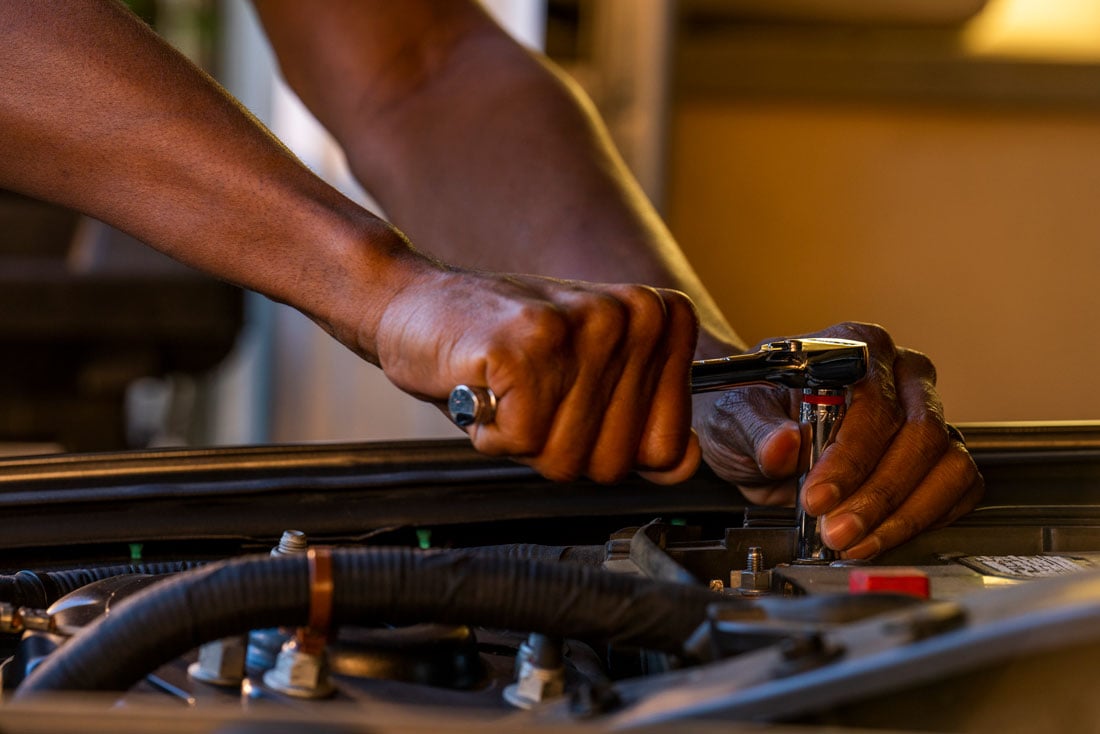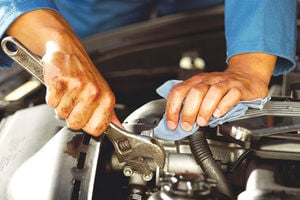
In order to avoid being cheated, a motorist should learn some aspects of their car and how it performs. Photo | www.autozone.com
Even if a car hardly has any issues, there is still regular maintenance such as changing the oil, rotating the tyres and replacing parts. While those who are car savvy can perform some maintenance on their own, chances are, they will have to go to a mechanic for more complicated issues. And while not all mechanics are dishonest, it is a profession that makes it easy to swindle customers.
In February 2023, Rebecca Nayebare’s car started making unusual sounds and vibrations in the steering wheel. When she visited a certain garage in Naalya, a Kampala suburb, the mechanic suggested a complete diagnosis to identify the root cause of the problem.
“He removed four parts he said were faulty, including the steering rack and gave me a quotation of Shs1.5m, including labour. Because I wanted to cut costs, after studying the quotation, I asked him ignore the shocks absorbers and instead, only fix the steering rack and one other part. The cost reduced to Shs700,000 and labour of Shs150,000,” Nayebare says.
“After telling me everything had been fixed, the car stabilised for about two weeks and the same problem resurfaced. I was perturbed, especially since the mechanic said he had bought new spare parts. I feared going back to the same garage but after asking my workmates, my employer recommended her mechanic who ended up charging me only Shs150,000 to fix the problem. And since then, it has not resurfaced,” she adds.
Nayebare is just one of the many unsuspecting motorists who have had similar, or even worse experiences with mechanics. Professionally, when you drive to any garage, the mechanic should be able to describe, explain and if possible, demonstrate how they will fix any mechanical fault so that you understand what is going to be done.
You could even go for a test drive with them so they fix the fault from an informed perspective. The more you are educated about what is ailing your car, the harder it is for you to be cheated. However, the more your mechanic hides any information from you by trying to use technical terms you do not understand, the easier it is to be cheated.
The air conditioner (AC)
During the car service process, there are lies that mechanics normally lead with. For instance, if your car has been running with the air conditioner turned on and you park, it is normal for water to drip under the car. Unfortunately, because most motorists do not know this, they will rush to the garage thinking there is something wrong with the car.
“Mechanics normally tell unsuspecting car owners that the radiator is defunct or that it has a leakage that will eventually cause the car to overheat. For most motorists, this will cause panic, especially knowing that such a fault will eventually affect the engine. What mechanic usually do is to go below the car and block the water passage. Because you cannot go under the car to verify this, you are quick to pay for the repair,” says Peter Amadi who has been a mechanic for more than 30 years.
Eventually, instead of the AC water dripping out, it will be channeled somewhere else which spoils the car. After driving for approximately one or two weeks, there will be other complications.
“The solution to this is sticking to one garage. A number of motorists move from one garage to another looking for mechanics who will charge cheaply. But in looking for cheap service, one ends up paying for more costly damages to the car. A mechanic you know and have used for a while will understand the mechanical history of your car and can fix faults from an informed point of view,” Amadi advises.
The brake system
All cars experience normal wear and tear of crucial parts such as the brake system, especially the brake pads. Observed physically, brake pads have a small metal sheet from which a motorist can tell when they are almost wearing out. Usually, when in bad condition, the metal sheet squeaks loudly when one steps on the brakes.
If you insist on driving, the metal sheets start rubbing against the brake discs, also known as the brake rotor, a part of the brake system onto which the brake pads rub or touch to control or stop the car.
“Because you do not know the thickness of the brake pads well, when the brake pads measure approximately three quarters, in which case you can drive for approximately two months, mechanics tend to lie that they are old, urging you to buy new ones. And because many do not take the old brake pads, the mechanic keeps and sells them,” Amadi explains.
Check engine light
According to www.spotdem.com, the dreaded check engine light haunts everyone at one time or another. It never comes on at a good time, and while it has the potential to be something minor, in most cases, it ends up being a huge expense to the owner. This is because mechanics try to charge customers more to do a simple fix.
Even more, many mechanics are never upfront about what the issue is. If you can, Amadi advises,get your very own diagnosis tool. It does not really cost much but will be helpful for basic diagnosis, which will in the end help you avoid being ripped off.
In close relation is the quality and quantity of engine oil, which is usually measured by the dipstick. When engine oil is properly circulating, things such as viscosity, texture and colour tend to change. Because many motorists do not understand some of these components, mechanics will use this chance to come up with faults such as engine knocks without going into details of what it is and why it could happen.
“If the oil is black, brownish or gold in colour, this could indicate different things. The fact that oil changes colour may not necessarily mean that it is old; it could still be functional for some time,” says Alvin Nkini, a mechanic.
Be present
Some motorists call their mechanics to pick the car from home or at the workplace. They are serviced and returned later with a quotation and in most cases, many pay without understanding what was replaced. Most non-trustworthy mechanics take advantage of the fact that you are too busy to pay attention to your car and so, they charge you higher amounts of money.
However, it is important that the mechanic goes over what they are going to do with the customer before starting the repairs. Usually, it is only to diagnose the problem first since the repair will more than likely cost the customer money.
The reason why this step is important is that a garage should be compensated for any work that is performed. That is why they ought to ask for permission in order to avoid misunderstandings when payment is made.
According to www.prudentmechanical.com.au, not all mechanics are bad. So, before you decide to go ahead with repairs, take a glimpse at how repair shop looks. If their garage is clean and orderly, it is reasonable to expect they will apply the same approach to their business as a whole.
Minimising risk
• Ask for the estimate in writing and if something does not seem right about the estimate, ask questions before signing anything.
• Get a written list of items to be fixed or replaced.
• Ask for all parts that are removed from your car.
• Get a second opinion from another mechanic to be sure that everything is done on your car makes sense.
• When you go to pick up your car, have the mechanic explain exactly what was fixed or replaced.
Source: prudentmechanical.com.au

